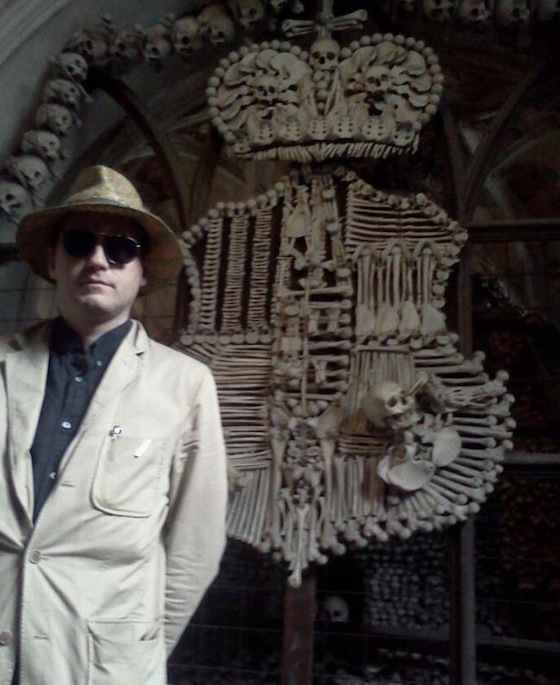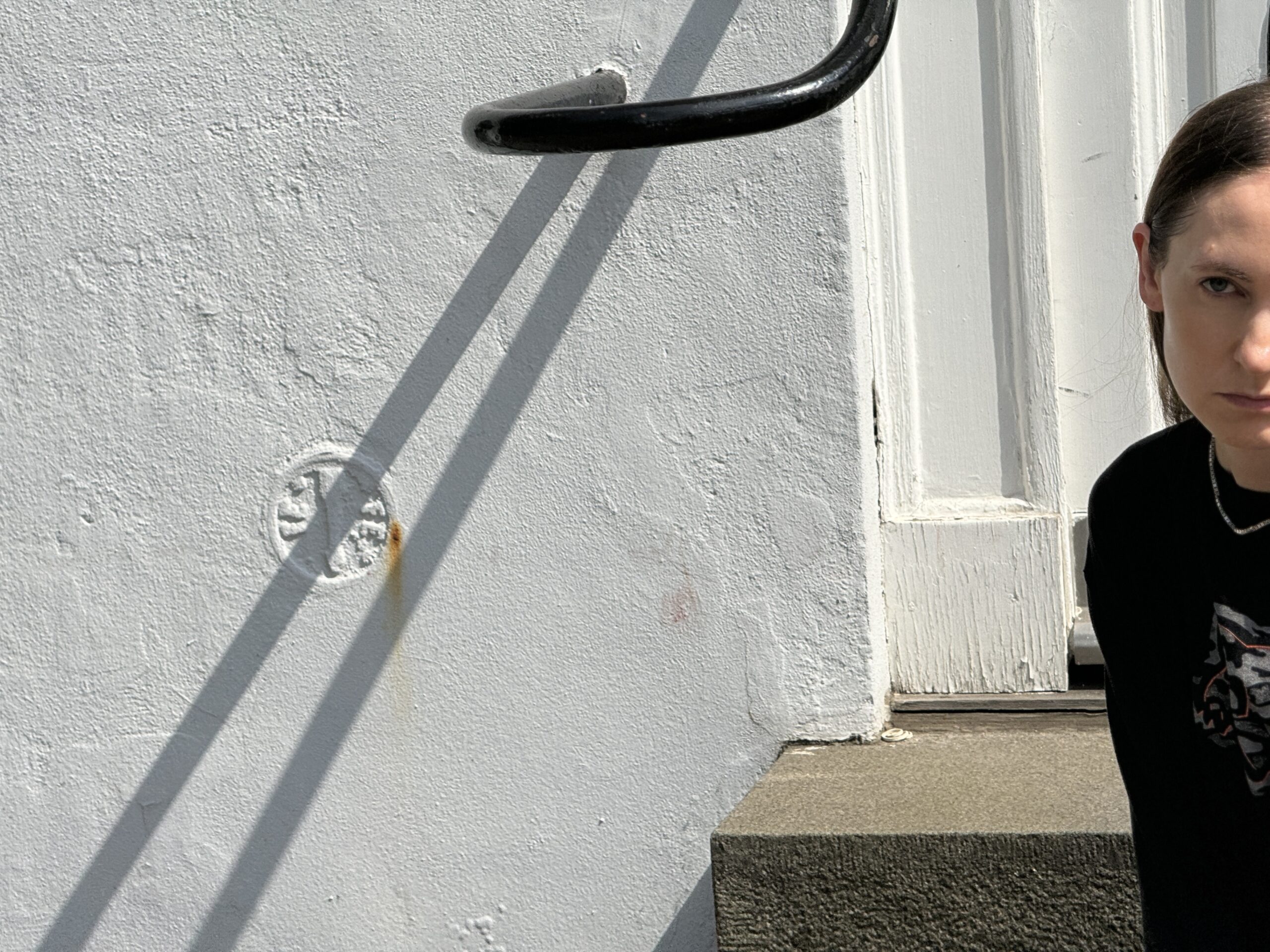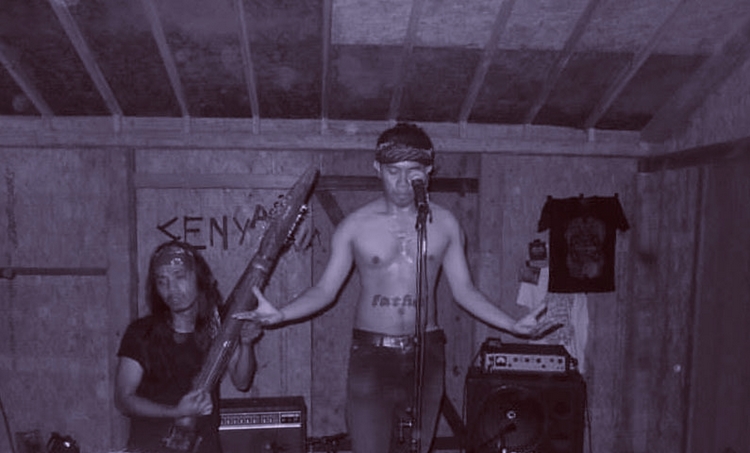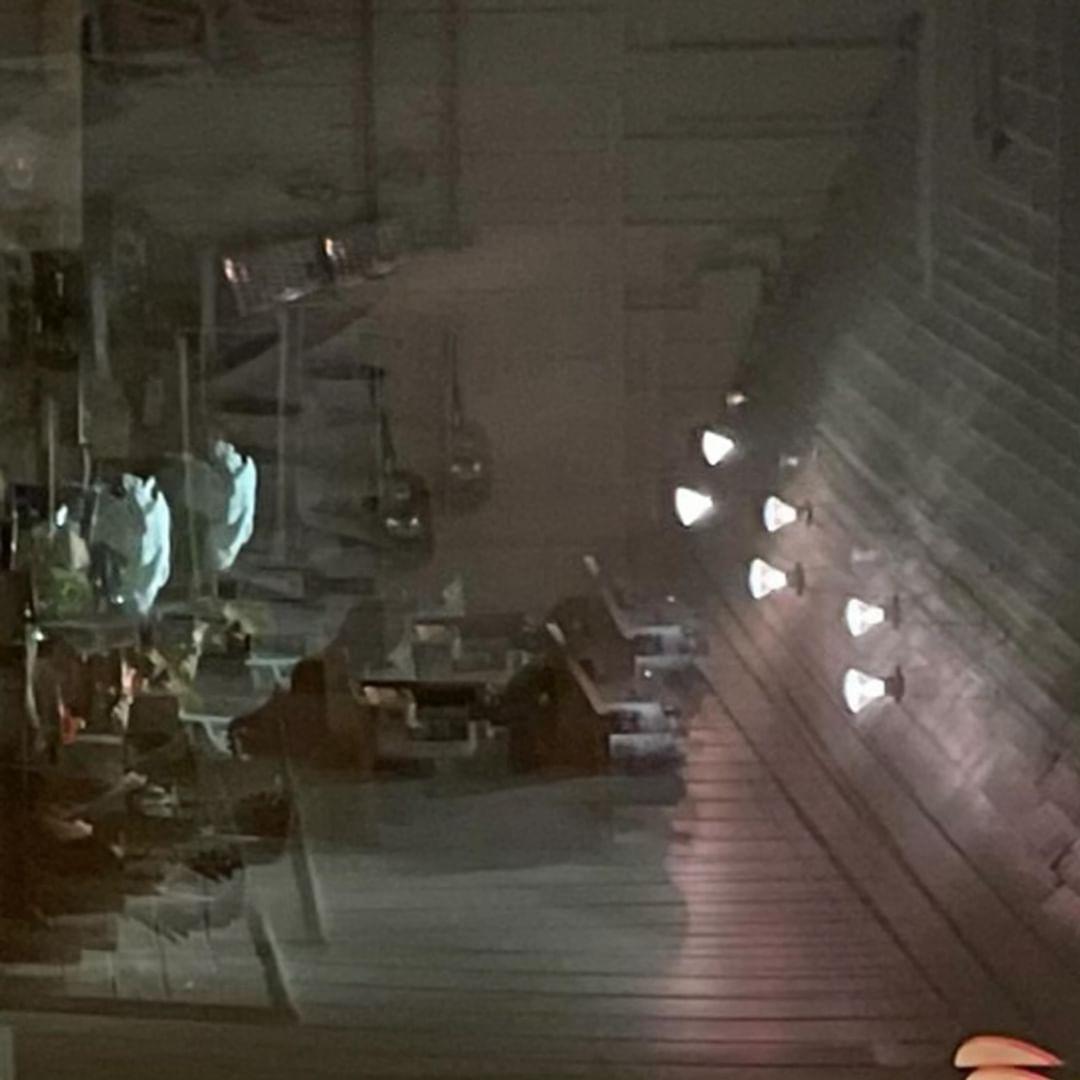Excepter – How not to obsess over every little thing, an interview with John Fell Ryan

Af Emil Thorenfeldt
New Yorks fremmeste eksperimenterende orkester, Excepter, udsender i dag Christisland, der er deres første reelle udgivelse efter et par års pause for improvisationsgruppen, som ellers har udgivet i adstadigt tempo siden 2002. Pladen bliver til gengæld den første i en række af udgivelser fra John Fell Ryan & co. i løbet af det næste års tid, og den har i særdeleshed et dansk aftryk i form af label, line-up, titel og coverbilleder. Excepter kan bedst beskrives som et improband med rockinstrumenter og trommemaskiner, der ser som sit eget formål at skabe en parallelvirkelighed til den gængse musikverdens måde at være sig selv bevidst, at være hip og at være konsumerbar – og derfor i spøg reduceres med FACT’s lakoniske beskrivelse: “Excepter is a freaky art/dance ensemble.”
Christisland-projektet har sit udspring omkring af erklærede Excepter-fans i form af folkene bag Sejerø Festival og Escho, som inviterede John Fell Ryan (ex-No Neck Blues Band) til Danmark sidste år og indspillede pladen i København med et flot og åbensindet line-up med amerikanske Robert Girardin (fra Jaws), Lala Ryan og Jon Nicholson, samt Malthe Fischer, Rune Kielsgaard, Nis Bysted og Niels Kristian Eriksen. Dermed er det nye label Cejero også kommet glimrende fra land med den første af fire planlagte udgivelser med hhv. de sidste to års mest prominente Sejerø Festival-navne, Excepter og noisemusiker Robert Turman, samt to andre Sejerø-affiliates i form af Menthol (Kim Las og Niels Kristian Eriksen) og toto (Tobias Kirstein og Toke Tietze Mortensen).
Passive/Aggressive: How did the record come about?
John Fell Ryan: – It started just getting us to Sejerø. That sort of brought us to make a whole tour, and in the making that tour we didn’t realise that Europe kinda shuts down around that time and that it would be difficult for us to find any shows in late July/early August. Paul Smith, who runs Blast First Records, said that we should make an album which we did; in order for us to make our way to Denmark I had to get a grant from the DIVA foundation and part of that was that I was to make a recording and involve local musicians and run a workshop. The record came about just of necessity before finding a way to get us to the magical island of Sejerø. It went really well, we all got along and had a great time. So I was ultimately left alone in Copenhagen for three weeks after the band left and after the tour and after the fest and everything. The mixing and overdubbing of the record was done during that period.
How does it differ from other Excepter releases and how was it recorded?
The core rhythms were programmed in collaboration but mostly Jon Nicholson doing drum machine programming and then everyone else sort of improvised on top of that. And it’s mostly instrumental which we do do but it’s distinct from our LP work which is focused around vocal songs. But we’ve always done these experimental EPs where we try on new hats.
Why instrumental? Was it just something that happened along the way?
It was originally planned to have vocals on it but it was recorded all instrumental, I just didn’t have any vocals ready when we hit the studio. I figured I would have time to add the vocals later during my solo stay in town but the more that I worked on it, the more it seemed to be unnecessary. I mean, I have lyrics and everything written out [laughs]. I recorded some vocals but it was so dense already it didn’t seem to need them other than the backing vocals.
With the type of recording process you have, a lot of the decisions are made pretty late in the process.
Oh for sure, especially with the last batch. We would tend to over-record and then reduce. Over-record multi-tracking and then cut away. There may be 20 minutes improvisation for each side and then ultimately it ended up being 16 minutes on one side and 11 minutes on the other. so there wasn’t that much editing for a record. It was more of just removing tracks. The funny thing is, we spent almost an entire day doing guitar overdubs on guitar overdubs on the tracks and then when it came down to it I just jettisoned all of them. The sort of heavy metal guitar sound you’ll hear on the EP is actually a synthesizer. Lala [Ryan] played that on her white plastic Roland synthesizer.
It’s difficult to define the Excepter sound. How would one even go about putting a genre on it?
I’m loath to do it [laughs]! We have our influences but they don’t tend to be our contemporaries. It’s influenced by record collecting. Improv for sure, but also tools and techniques of electronic dance music. Drum machines and synthesizers, etc. But we don’t make dance singles.
Yeah, you can definitely track a lot of different influences from reggae to early German electronic music.
Yeah, we love all that stuff.
But two people with the exact same influences will end up in totally different places.
One thing that we’re really lousy at is making replicas. We’re not talented enough to make a good imitation of something. Some LCD Soundsystem I just don’t relate to at all. Even though we’ll maybe have ripoffs in our stuff it just won’t sound like whatever we’re ripping off. We have no technique [laughs].
The advent of streaming services such as Spotify has changed the landscape of the music industry for better or worse. Do you feel like music is cheaper these days?
The cheapening of music has been going on for quite some time, I mean it’s always been kind of cheap. I would even point the finger at Dischord Records and Fugazi for deciding that in order to be cool a concert has to be $5 and a record has to be $10 and we’re just gonna set these prices. If you make something $10 and $5, these round numbers, people think about them when they think about music. They think that that’s the value even though you haven’t adjusted for inflation in how many years? So now it’s at the point where people feel guilty if they’re gonna charge $20 for a show. So it’s deeper than just the digital question though that’s certainly a part of it. And it’s also a wider economic situation where we’ve had cascading recessions since the turn of the century.
Is music intrinsically linked to a monetary value?
Well, there is an exchange, especially with a record. A record itself is almost like money; it’s printed, it has symbols on it to demarcate it, it’s traded back and forth. You can see analogies between the used record market and the stock market. And what about rare records? It’s not like the artist gets a big cut out of having a rare record out there [laughs].
No, you’re not contributing anything directly to the music industry by buying used records.
If the monetary value is the only thing you’re interested in then that’s true, but there are other forces at work, cultural forces. There are different types of value; the problem with money is that people sometimes focus too much on what’s measurable and that’s just a fraction of reality.
Are there any monetary considerations for Excepter? How do you decide how to price your records?
It’s not something we ever really had much of a say in because we’ve always dealt with other labels. We’ve only self-released some things on Bandcamp and maybe a CD-R here or there but for the most part it’s through other people.
I figured you might get a say but I guess not.
We have a say in how they’re designed. Of course there’s monetary considerations in touring because things need to get paid for, you can’t just wing it and buy a plane ticket [laughs]. We consider money, Debt Dept. is of course in a way about money and Presidence features money on the cover. We were going through a recession so money was on your mind. And you get to that certain age and you think about money all the time because you need it in order to survive. So in a way it becomes a subject – I mean in a way we’re a blues band – so money becomes one of the sad things you sing about along with heartbreak and other popular blues topics.
I can imagine touring is hard to break even on.
Well, we’ve kinda broken even here and there. We don’t tour that much. We’re not a full-time professional touring band.
What’s your main motivation to keep making music?
It’s just what we do. That’s just who we are. We’ve been making records for 20 years. And it’s not part of ”I’m a sexy young thing”, and even when I was a sexy young thing it wasn’t a part of that either. I don’t see me stopping. The reason why Kiss makes records is not why I make records. I don’t make records to get chicks [laughs]. There are others ways of getting that stuff than having to make records!
You’re probably playing the wrong kind of music too.
Yeah! It’s kind of silly for them to say that because you would ”get chicks” even if you didn’t play music. Everyone gets chicks [laughs]. People fall in love all over the place. It’s not a motivation for doing things. I don’t understand motivation anyway. People need reasons to do things? I just don’t question the impulse. I don’t question my instinct.
You just played a 20 year anniversary gig with No Neck Blues Band. Do you have more shows planned?
There’s no plans but we all had a great time doing it. It was a real joy to all come together. We had a series of rehearsals to get familiar with each other again and I thought it panned out really well. It wasn’t the first time I’d re-united with the band. I think I played two shows since leaving the band in the early 2000s. I did a guest appearance in 2004 or so and another show in 2010. There may have been others. I always kinda went to the shows anyway even after I left. After a while in music you just get to be the last people standing.
Was it hard getting back in the groove?
Not hard at all. I’ve been improvising the whole time [since leaving No Neck] so it was really easy for me to jump in and play that kind of music.
How would you characterise the differences between Excepter rehearsals, records and live shows?
Live is always a bit more experimental just by the nature of it. There’s no editing involved other than restraint, or lack thereof. But so many of the records were made live. They just captured certain moments or passages that beared repeating. It’s just about playing together and the surprises that happen when you put different electronic systems together. We’re all still using sequencers and similar equipment but we have maybe 2 or 3 sound systems going at the same time.
Has the sound of the recordings gotten closer to the live sound over the years?
I’d like to think that we’ve gotten better at being the same live and recorded. But you also change the way the record sounds to make it closer to the live sound.
Is there less editing involved these days, then?
It’s hard to say. We used to record and publish almost every single one of our concerts but we kinda stopped doing that. We do it here and there but it’s mostly that I just stopped feeling the need. Maybe I just wanted to get the records out and was wondering if having all the live recordings was just muddying the waters. And maybe making the live shows a bit more exciting, like you can’t miss it because you’re not gonna hear it again. Though I guess it makes it hard because most people don’t live in New York. When people come up to us and say ”will you come and play my town?” I’m like ”will you come and visit us?”. It’s a bit more cost-effective if you come and see us play in New York than if we come play for you in Florida or wherever.
Or Copenhagen?
Yeah [laughs]!
What affects the sound of what you’re playing, whether live or in the studio?
The equipment we’re using has a lot to do with it. A lot of equipment broke on me and I lost a fair amount of equipment. So, whatever’s left [laughs]. But sometimes I just do vocals. In the early days of Excepter I tried to do everything. I tried to pick out all the equipment and bring tons and tons of equipment on stage. And then other members of the band brought their own systems and then we had five times as much equipment on stage. With touring and everything we had to pare down. But I don’t know if that makes the sound more stripped down.
Do you see it as a blessing in disguise when something breaks on you because it forces you to change things up?
No, man, I really miss those things [laughs]. I broke my heart when these things would break. They had a personality to me. It’s like if R2-D2 dies in Star Wars. It’s like that. They’re robots but to you they have feelings. I have the recordings to remind me but whenever I hear someone else using or see one of my old synths I get really jealous. If you ever wanna float a few thousands dollars my way … [laughs]
I read some of the stuff you wrote about The Shining. Have there been any other similar projects you’ve obsessed about?
No, The Shining is special to me. I’ve always been a film fan and loved the analysis side of it but for me Stanley Kubrick and The Shining just remain paramount. No one is really like him. But I haven’t really gone over the deep end with anything other than that. I had to give it a rest as I’ve gotten more involved with the band again. I was for real obsessed with it in a way that I couldn’t stop myself from going back to it again and again and again. But I apply that kind of rigour to Excepter as well. The mixing and editing process is very much like that, you’re dealing with one thing and you go right into the details and obsess over every little thing, every nook and cranny to try and create a work of art.
Info: Excepter “Christisland” udkommer i dag den 18. november på Cejero/Escho (pre-order). Det er faktisk anden gang, at et dansk label udsender musik med Excepter, eftersom Skrot Up udgav kassettebåndet “Zion” i 2010.



